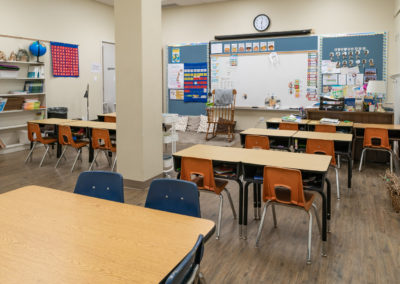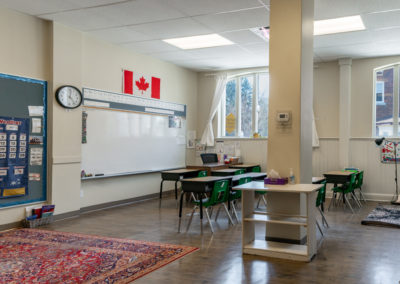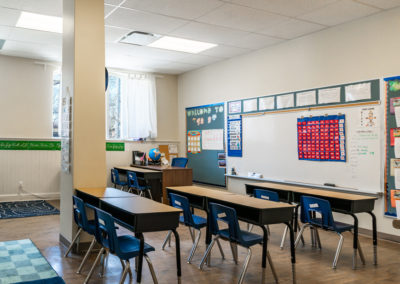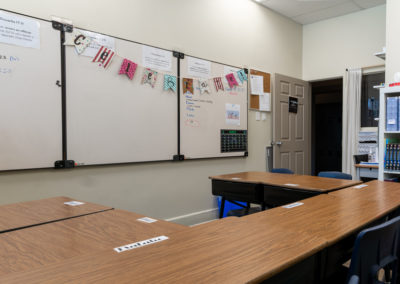
Grammar Stage (Grades 1 to 6)
The Classical Model
The knowledge, skills, character, and study habits acquired during the Grammar stage (Grades 1-6) are foundational for future success. Students at this age have minds that are excited about new facts and are able to memorize easily. The Classical model utilizes this unique period in a child’s cognitive development to focus on memorization of facts – grammar, math, science, Latin, history, and geography – through stories, song, chant, rhyme, and drama.
Grammar school teachers utilize simple research projects, experiential assignments, field trips to cultural attractions in Toronto, historical re-enactments, and a number of other methods to engage students in the learning process.
The classical model and WCCA’s specially-chosen curricula offer students content taught through an engaging, integrated, and interactive approach to learning. True to the classical model, all subjects are taught as interconnected.
Integrated Subjects: An Example from a Grade 3 classroom
In Literature they may learn about Elizabethan drama and the major playwrights of the era, re-enacting scenes from famous Shakespearean plays.
In Composition students would practice the writing skills with pieces focused on re-telling famous pieces or imagining a scene from the Elizabethan era.
In Geography students explore England and its neighbours at the time of Elizabeth’s reign.
In Science, Math, Music, and Art students explore the great achievements made during Elizabeth’s reign in those fields. Students at this age enjoy interactive and experiential learning, engaging all of their senses. Students may participate in an Elizabethan feast, learn a dance popular at the time, sing and play music composed during the era, replicate art produced during the time, build a model of the Globe Theatre or the Golden Hinde, or re-enact a famous battle.
This interdisciplinary, integrated approach spans the world, including a wide variety of cultures.
A Typical Day
A typical day begins with students eagerly expressing their hearts in their journals. Morning liturgies (routines) include an opening song or hymn, prayer, memory verse, and calendar time. Mornings are filled with poetry, grammar, handwriting, phonics, and spelling. After recess, students study Mathematics through hands-on activities as well as calculation and fact memorization. Students discover Latin by singing songs designed to teach vocabulary words. After lunch and playtime outdoors, reading skills are developed during silent reading and in reading groups. Bible and prayer time is the highlight of the day. Afternoons may include science experiments, nature walks, gym class, history lessons, appreciating classical music, or imitating the artwork of famous artists. The day ends with listening to a chapter from a great novel, and praising God with the Doxology.
Habits
Literature, Composition, & Penmanship
Students study timeless literature carefully and thoroughly with their teachers. Each of the books, short stories, and poems chosen are selected because of their enduring value and their author’s exemplary writing style. WCCA students study literature that corresponds to their historical and geographical studies. Studying literature contemporaneous with the historical and geographical time period allows for a richer, deeper understanding of the world’s greatest civilizations.
Students learn to write with excellence through imitation. Consistent exposure to great works of literature trains the ear and the eye to styles of superior writing which students then learn to model into their own compositions.
Science
Arithmetic
Latin
Biblical Studies
History & Geography
In Geography, students learn about the geographical areas they are studying in history. Students study each continent, examining features such as countries, important cities, major bodies of water, and mountain ranges.
Visual Arts
Students learn about great artists who have devoted themselves to the study of beauty, virtue, and truth. They examine various works of art that are outstanding expressions of the periods of history that they are studying concurrently. Strong connections are also made with other areas of study such as Mathematics and Science.
Physical Education
Music
The WCCA choir, which includes all students at the school, offers students an opportunity to further develop their voices and their ears, as well as learn to harmonize. The choir performs at Christmas programs and other events. In our annual Spring Musical, Grammar students also perform in the chorus.
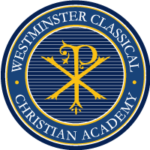 WESTMINSTER CLASSICAL
WESTMINSTER CLASSICAL
CHRISTIAN ACADEMY
9 Hewitt Avenue, Toronto, Ontario M6R 1Y4
(416) 466-8819 x 306 | office@westminsterclassical.ca
